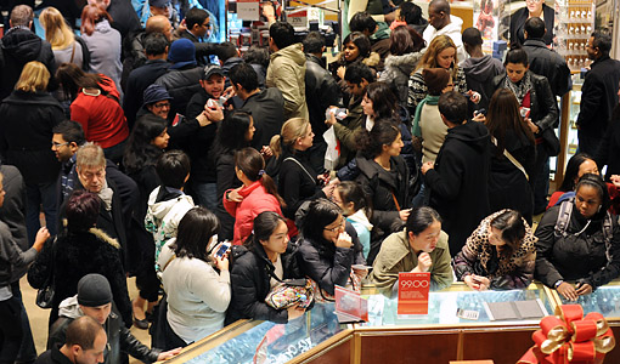Our current consumer culture is, according to researcher Russell Belk, best understood as "a culture in which the majority of consumers avidly desire, pursue, consume and display goods and services that are valued for non-utilitarian reasons such as status, envy, provocation and pleasure-seeking." Whether you reside in a major metropolitan city or a rural outpost of North America, you are part of the worldwide consumer culture. To ignore the importance of material possessions in our lives would be equivalent to ignoring that we are born of mothers and fathers.
As a professor at Baylor University, I have spent more than 20 years conducting research with thousands of consumers from all walks of life on the related areas of materialism, credit card use and compulsive buying. Why, in a land of plenty, do Americans want more? And why is more never enough? Given that most Americans would readily admit that money and material possessions are not going to make us happy, why do we continue to act as if they will?
The emergence of a worldwide consumer culture has potentially severe consequences for everyone. Even if you don’t practice or espouse materialistic ideals, you are affected by others’ pursuit of them. A good example might be the ghost of a recent Christmas past for retailing giant Walmart.
Surely a man the size of Walmart worker Jdimytai Damour could control the expectedBlack Friday shopping crowds. At 6 feet 5 inches and 270 pounds, he was a force to reckon with. In fact, he was chosen to work the front entrance to the Walmart store at the Green Acres Mall in Valley Stream, N.Y., precisely because of his hulking frame. But, alas, he was no match for the crowd of 2,000 Walmart shoppers eagerly awaiting the 5 a.m. store opening. A few minutes before store opening, the throng could no longer be held back. The sliding glass doors that separated the would-be shoppers from the holiday bargains ("door busters" takes on a whole new meaning) bowed from the bodies pressed against them. Six to 10 workers attempted to no avail to push back, but they were fighting a losing battle.
In an instant, the glass doors shattered and the frenzied mob surged into the store in search of the heavily discounted "door busters" available in limited quantities for a short period of time. Tragically, Damour was thrown to the floor and trampled to death (the official cause of death being asphyxiation related to his trampling) in the stampede that streamed over him in pursuit of bargains on big-screen TVs, electronics, clothing and a myriad of other consumer goodies. One shopper, Kimberly Cribbs of Queens, said that the crowd acted like "savages." And the shoppers’ bad behavior didn’t end with the trampling of Damour. When the shoppers were informed that the store would need to be cleared because of the death of an employee, many continued to shop, yelling that they had been waiting in line since the day before. Many had to be escorted from the store.
The Oxford English Dictionary defines materialism, in that word’s common usage, as "devotion to material needs and desires, to the neglect of spiritual matters; a way of life, opinion, or tendency based entirely upon material interests." I think of materialism as a mind-set, an interest in getting and spending, the worship of things, the overriding importance that someone attaches to worldly possessions. For a consumer who has fully embraced shiny objects, possessions take center stage and are considered to be the primary source of all happiness. Money and material possessions are seen as an end in themselves rather than as a means to an end. Materialism is the cornerstone of our modern consumer culture.
We Americans attempt to find happiness and satisfaction through the acquisition of possessions, which typically assume a central role in our lives. Of course, not all Americans are equally materialistic, but on average we are a materialistic lot. Those of us who are highly materialistic (let’s use the term "materialists") believe that expanded levels of consumption will increase the amount of pleasure we achieve in life. Research, however, paints a bleak picture for happiness through acquisition, consistently showing that those of us who live materialistic lifestyles are less happy with our lives than less materialistic people are. On average, U.S. consumers are no happier than less profligate consumers around the world.
Materialists tend to judge their own and others’ success by the number and quality of accumulated possessions. The primary value of possessions, for diehard materialists, is their ability to confer status and project a desired self-image. Materialists view themselves and others as successful only to the extent that they possess products that project a desired image. How successful can my colleague be, they wonder, driving a car like that? Judging others by what they possess is a deeply ingrained part of our collective psyche.
In our rush, rush world, a common way we tell others who we are (or would like to be) is through our use and display of material possessions. He drives a Mercedes, so he must be a captain of industry. A truck and he must be a cowboy or at least a rugged individualist. A Hummer, and - I’m not sure what that says about the driver. This tendency to define ourselves by the products we consume results in what researchers call the "extended self"; in other words, our possessions become an extension of who we are. I amend the label to the "overextended self" when referring to consumers who have fully embraced the shiny-objects ethos. Research has found that highly materialistic people value their possessions for their ability to conjure up a desired social image, whereas their less materialistic brethren value their stuff for the pleasure and comfort it provides.
Furthermore, as you’ve probably noticed with your more pretentious acquaintances, materialistic people are more likely than less materialistic people to mention an item’s financial value when describing why it’s important to them: "That cost me nearly $30,000!"
Not only do a person’s materialistic values affect how he or she relates to possessions, but they also affect how that person spends money. Compared to less materialistic people, materialists believe that they require more money to satisfy their "needs" and are more likely to spend money on themselves and friends and donate less to charities.
The "Great Recession" of 2008-2009 and the continuing economic malaise have the average folks on Main Street on edge regarding their financial futures. With high unemployment, mortgages being forfeited and credit being tightened, it’s likely that Americans will spend less this year - and that’s a terrifying thought for citizens who have been taught that shopping is a patriotic act. We live in a country where we are repeatedly told that happiness can be purchased at the mall, online or from a catalog, so the idea of scaling back on our purchases is frightening. But I’ve got some good news to share: happiness is not positively correlated with consumption.
Between 1972 and 2010, the standard of living in America increased dramatically. When we produce more, we consume more, and within that time period, our national output per capita increased by 96 percent. But GDP for earlier years has been adjusted to current dollars. Happiness data was taken from the General Social Survey (GSS) of more than 50,000 people and represents the percentage of people who responded "pretty happy" to the question: "Taken all together, how would you say things are these days - would you say that you are very happy, pretty happy, or not too happy?"
But while our standard of living has improved over the past 30 to 35 years, our happiness has not. In fact, as the graph above depicts very clearly, our happiness has flatlined. The graph shows that the number of people reporting that they are "pretty happy" has varied little. So what does this mean? It means that more stuff does not necessarily make us any happier. And this particular study paints a "rosier picture" than other research findings - alternate surveys reveal that the more we spend the less happy we are.
Throughout my book I reveal surprising studies that showcase just how deeply ingrained our materialism and spending habits are in all aspects of our lives. A substantial amount of research supports the materialism-happiness disconnect. Materialism negatively impacts (1) how we feel about ourselves, (2) our personal relationships, (3) our life satisfaction and (4) of course, our finances.
One of the more obvious negative outcomes of materialism is that fourth point: the havoc it wreaks on our finances. No matter how much we consume, we never get closer to happiness; we only speed up the treadmill. This process of adaptation has both positives and negatives. The primary positive is that we adjust quickly to most bad things that befall us; however, we adapt to good things equally well, and that can be problematic to our happiness and financial well-being. For example, the (huge) 2,500-square-foot house almost instantaneously becomes the new "normal."
We are like drug addicts, needing a continuous fix of newer, bigger and shinier possessions. We need more and more of the good stuff to achieve an equivalent (albeit ephemeral) high. As you can imagine, all of this spending has a ruinous effect on our finances. We are a nation of compulsive buyers, purchasing products far in excess of our needs and resources. Outside of our basic need for food, shelter and clothing, everything else we purchase is discretionary. Given that nearly three-quarters of all U.S. families live paycheck to paycheck, it is obvious that many of us struggle with money issues.
Money and the accumulation of material possessions are such an integral part of our current consumer culture that few have stopped to think about how this mad material dash has impacted their quality of life. But judging by the latest research on materialism, it appears that our perspective may be beginning to change. Can we reject our obsession with possessions and embrace a willingness to get involved in community affairs and social issues? I hope so, and I explain how in Shiny Objects, a hopeful tale of how true happiness can still be found in a culture awash in material possession love.
Read more from St. Thomas magazine





